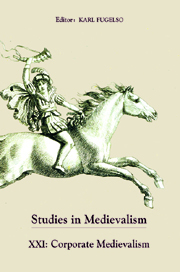Book contents
- Frontmatter
- Acknowledgments
- Contents
- Title in the Series
- Editorial Note
- I Corporate Medievalism: Some Perspective(s)
- Lives of Total Dedication? Medieval and Modern Corporate Identity
- Reincorporating the Medieval: Morality, Chivalry, and Honor in Post-Financial-Meltdown Corporate Revisionism
- Medievalism and Representations of Corporate Identity
- Knights of the Ownership Society: Economic Inequality and Medievalist Film
- A Corporate Neo-Beowulf: Ready or Not, Here We Come
- Unsettled Accounts: Corporate Culture and George R. R. Martin's Fetish Medievalism
- II Interpretations
- III Response
- Notes on Contributors
- Title in the Series
Unsettled Accounts: Corporate Culture and George R. R. Martin's Fetish Medievalism
from I - Corporate Medievalism: Some Perspective(s)
Published online by Cambridge University Press: 05 February 2013
- Frontmatter
- Acknowledgments
- Contents
- Title in the Series
- Editorial Note
- I Corporate Medievalism: Some Perspective(s)
- Lives of Total Dedication? Medieval and Modern Corporate Identity
- Reincorporating the Medieval: Morality, Chivalry, and Honor in Post-Financial-Meltdown Corporate Revisionism
- Medievalism and Representations of Corporate Identity
- Knights of the Ownership Society: Economic Inequality and Medievalist Film
- A Corporate Neo-Beowulf: Ready or Not, Here We Come
- Unsettled Accounts: Corporate Culture and George R. R. Martin's Fetish Medievalism
- II Interpretations
- III Response
- Notes on Contributors
- Title in the Series
Summary
Tyrion owned a fine suit of heavy plate, expertly crafted to fit his misshapen body. Alas, it was safe at Casterly Rock, and he was not. He had had to make do with oddments […]: mail hauberk and coif, a dead knight's gorget, lobstered greaves and gauntlets, and pointed steel boots. Some of it was ornate, some plain, not a bit of it matched, or fit as it should. […] Shae stepped back and looked him over: “M'lord looks fearsome.” “M'lord looks a dwarf in mismatched armor,” Tyrion answered sourly.
From the Pearl-poet to the Pre-Raphaelites and beyond, the trope of the knight's farewell to his lady before battle nicely condenses the ideals of courtly love, aristocratic valor, pageantry, and chivalry. To open the battle between the Stark and Lannister forces in A Game of Thrones, George R. R. Martin presents us with a relentless attack on the trope. The excellent and costly armor covers a “misshapen,” stunted body, and is not even available for use. Tyrion, the leader of one flank, has never been in a battle, and the admiring lady is a whore Tyrion bought from one of his soldiers, whose early promise of a Dulcinea-like transformation ends abruptly as she sells out Tyrion to certain death in a later volume. Moreover, unlike the warlike and noble Starks, the Lannisters' primary means to power is through the accumulation and deployment of wealth.
Information
- Type
- Chapter
- Information
- Studies in Medievalism XXICorporate Medievalism, pp. 57 - 64Publisher: Boydell & BrewerPrint publication year: 2012
